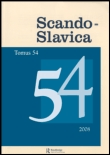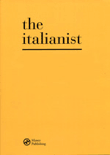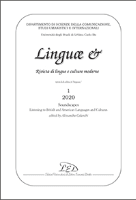
Balkanistic Forum
Scope & Guideline
Connecting Disciplines to Enrich Balkan Scholarship
Introduction
Aims and Scopes
- Historical Analysis of the Balkans:
The journal emphasizes the historical narratives of the Balkans, exploring various dimensions such as political, social, and cultural histories, particularly through the lens of post-communist transitions. - Cultural Studies and Ethnography:
It integrates cultural studies and ethnographic approaches, examining how local cultures, traditions, and identities have evolved and interacted across national boundaries. - Gender Studies and Feminist Perspectives:
The journal highlights gender studies, focusing on the roles and representations of women in historical and contemporary contexts, and their contributions to societal changes. - Postcolonial and Transnational Perspectives:
It addresses postcolonial themes and transnational influences, particularly in relation to the Balkans' interactions with broader European and global trends. - Social Issues and Welfare:
The publication investigates social issues, including welfare systems, healthcare, and the impact of political ideologies on marginalized communities within the region. - Language and Communication:
The journal explores language dynamics, including issues of linguistic identity, language politics, and the role of language in shaping cultural narratives.
Trending and Emerging
- Interdisciplinary Approaches to Social Issues:
There is a growing trend towards interdisciplinary research that combines history, sociology, and cultural studies to address complex social issues in the region. - Focus on Marginalized Communities:
Increasing attention is given to the experiences and histories of marginalized communities, including ethnic minorities and women, reflecting a broader societal acknowledgment of diversity. - Contemporary Political Discourse:
Emerging themes include analysis of contemporary political discourse, particularly in relation to nationalism, identity, and the impact of recent geopolitical changes. - Digital Humanities and Archival Studies:
The integration of digital humanities approaches, particularly in archival research and the use of digital tools to analyze historical data, is becoming more prevalent. - Environmental and Ecological Perspectives:
There is a rising interest in environmental issues and the historical impact of socio-political changes on ecological landscapes in the Balkans.
Declining or Waning
- Traditional National Histories:
There has been a noticeable decline in papers focusing solely on traditional national histories, indicating a shift towards more transnational and comparative approaches. - Solely Historical Narratives without Interdisciplinary Approaches:
Papers that focus exclusively on historical narratives without integrating cultural, social, or political analysis are becoming less common, suggesting a move towards more interdisciplinary scholarship. - Focus on Soviet-era Studies:
The specific focus on Soviet-era studies appears to be less prominent, possibly due to a broader interest in contemporary issues and post-communist transitions. - Conventional Gender Roles:
Explorations of conventional gender roles in historical contexts are waning, replaced by more nuanced analyses that consider intersectionality and contemporary gender dynamics. - Localism without Broader Context:
There is a decreasing emphasis on localized studies that do not connect to broader regional or global contexts, reflecting an evolving understanding of the Balkans' place in the world.
Similar Journals

Litera-Journal of Language Literature and Culture Studies
Unveiling the Rich Tapestry of Cultural NarrativesLitera - Journal of Language Literature and Culture Studies is a pioneering open-access journal published by the esteemed Istanbul University, Faculty of Letters, since 2017, dedicated to the in-depth exploration and critical analysis of language, literature, and cultural studies. With an ISSN of 1304-0057 and an E-ISSN of 2602-2117, the journal aims to foster a diverse discourse within the arts and humanities, particularly in literature and literary theory, linguistics, and cultural studies. Although it currently holds a modest Scopus rank among its peers, it serves as a valuable platform for emerging scholars and seasoned researchers alike, aiming to enhance understanding and appreciation of cultural narratives within the global context. The journal provides a unique opportunity for authors and readers to engage with original research, critical reviews, and creative works that are vital to the advancement of interdisciplinary studies. Based in Istanbul, Turkey, it is positioned at the heart of cultural exchange, making it a significant contributor to scholarly communication in the region and beyond.

Scando-Slavica
Unveiling the Complexities of Cultural ExchangesScando-Slavica is a renowned academic journal published by ROUTLEDGE JOURNALS, TAYLOR & FRANCIS LTD, specializing in the rich interplay of Scandinavian and Slavic studies. With its ISSN 0080-6765 and E-ISSN 1600-082X, the journal has been a critical resource for scholars since its inception in 1954, covering a wide range of disciplines including archaeology, cultural studies, history, linguistics, and literature. As of 2023, it has consistently ranked in the third quartile across various categories, indicating its influential role in disseminating innovative research within the arts and humanities. With a focus on interdisciplinary dialogue, Scando-Slavica aims to foster a deeper understanding of cultural exchanges and linguistic connections, making it an essential read for researchers, professionals, and students interested in exploring the complexities of Nordic and Slavic interactions. While currently not an open access journal, its contributions have garnered substantial citations, bolstering its academic impact and relevance in a diverse scholarly landscape.

Lingua Montenegrina
Exploring the Depths of Montenegrin Language and LiteratureLingua Montenegrina is a distinguished academic journal dedicated to exploring and advancing the fields of Montenegrin language and literature. Published by the Institute of Montenegrin Language and Literature, this journal serves as a vital platform for researchers, educators, and students interested in the nuances and development of Montenegrin linguistics, literature, and cultural studies. With an ISSN of 1800-7007, it contributes significantly to the scholarly discourse in the region and beyond. While the journal operates under a traditional subscription model, it ensures that its readership has access to high-quality research that is pivotal for understanding Montenegrin identity and cultural expressions. The commitment of Lingua Montenegrina to rigorous academic standards and its focus on regional studies positions it as an essential resource for those looking to deepen their understanding of the Montenegrin language and its literary heritage.

Italianist
Exploring the Depths of Italian Culture and HistoryItalianist is a distinguished peer-reviewed journal published by Routledge Journals, Taylor & Francis Ltd, focusing on the multifaceted aspects of Italian culture, history, and anthropology. With a proud history spanning from 1981 to 2001 and then again from 2003 to 2024, this journal caters to a global audience of scholars, professionals, and students seeking to deepen their understanding of Italian studies. Although it currently operates without an open access option, it provides invaluable insights that contribute to critical discourse in the field, evidenced by its rankings in Scopus: Q4 in Anthropology and Q3 in History, demonstrating its growing influence among academics. The journal is based in the United Kingdom and strives to promote high-quality research that explores historical narratives, cultural practices, and anthropological themes related to Italy, making it an essential resource for anyone interested in this rich and vibrant area of study.

Jordan Journal of Modern Languages & Literature
Showcasing Excellence in Language and Literary ResearchJordan Journal of Modern Languages & Literature is a prestigious academic journal published by Yarmouk University, Deanship of Research & Graduate Studies. This journal serves as a vital platform for scholars and researchers in the fields of linguistics and literature, offering a well-rounded examination of modern languages and literary theory. With an impressive Q2 ranking in Linguistics and Language and a Q1 distinction in Literature and Literary Theory as of 2023, it consistently features high-quality research that contributes to the advancement of knowledge in these domains. The Scopus rankings further reflect its academic rigor, placing it in the 79th percentile for Literature and Literary Theory and maintaining significant influence in related fields, making it an essential resource for researchers, professionals, and students alike. Although it does not operate under an open-access model, the journal's commitment to publishing groundbreaking studies can significantly aid in the understanding and progression of modern linguistic and literary practices. The Jordan Journal of Modern Languages & Literature continues to be an influential voice in fostering scholarly dialogue and advancing research in the humanities.

Expressions maghrebines
Unveiling the Depths of Maghreb Literary TheoryExpressions maghrebines, an esteemed journal published by Florida State University, fosters scholarly dialogue in the realm of Literature and Literary Theory, focusing on the vibrant narratives and critical discourses emerging from the Maghreb region. Established in 2002, this journal has become a vital resource for researchers, professionals, and students, illustrating a commitment to exploring contemporary trends in Francophone literature. With an impressive Q3 rank in 2023, it stands within the top echelon of its category, offering insightful analyses and innovative perspectives to enhance academic understanding. Though not an open-access publication, Expressions maghrebines is indispensable for those seeking to delve into the cultural and intellectual currents that shape Maghreb literary landscapes, thus reinforcing its position as a significant contributor to the academic community's exploration of Francophone studies.

Theleme-Revista Complutense de Estudios Franceses
Connecting Scholars Through French Linguistic and Literary DiscourseTheleme-Revista Complutense de Estudios Franceses is a distinguished academic journal published by UNIV COMPLUTENSE MADRID, SERVICIO PUBLICACIONES, dedicated to the exploration of French studies within the fields of linguistics and literature. With an ISSN of 1139-9368 and an E-ISSN of 1989-8193, this journal has proudly maintained its Open Access policy since 1992, ensuring that scholarly research is accessible to a global audience. Based in Spain, the journal is committed to advancing knowledge and fostering discussion in French linguistic and literary theory, as evidenced by its publication history from 2019 to 2024. Despite its current classification in the Q4 quartile for both Linguistics and Literature and Literary Theory as of 2023, Theleme is positioned to grow in its academic influence, reflecting trends in interdisciplinary research. The journal’s rankings in Scopus underscore its unique contributions and the importance of its discourse in the arts and humanities. Researchers, professionals, and students are encouraged to engage with Theleme as a resource for innovative ideas and comprehensive studies that navigate the rich landscape of French language and literature.

Sibirskii Filologicheskii Zhurnal
Bridging Cultures Through Language and LiteratureSibirskii Filologicheskii Zhurnal is a prestigious academic journal published by the Russian Academy of Sciences, Institute of Cytology and Genetics. With ISSN 1813-7083, it is dedicated to advancing research in the fields of Cultural Studies, Linguistics and Language, and Literature and Literary Theory, and has achieved notable rankings, including Q2 in Cultural Studies and Linguistics, and Q1 in Literature for 2023. The journal provides a platform for scholarly discourse, contributing valuable insights to its fields with an evolving scope that spans from 2018 to 2024. Though not an open-access journal, Sibirskii Filologicheskii Zhurnal serves as a vital resource for researchers, professionals, and students in the Russian Federation and beyond, fostering a deeper understanding of linguistic and literary phenomena. Its commitment to high-quality content makes it an essential addition to any academic's library.

Linguae &-Rivista di Lingue e Culture Moderne
Fostering Scholarly Dialogue Across Modern LinguisticsWelcome to Linguae &-Rivista di Lingue e Culture Moderne, an esteemed open-access journal dedicated to the interdisciplinary exploration of modern languages and cultures. Published by LED EDIZIONI UNIV, this journal has been a vital resource since 2002, fostering scholarly dialogue and promoting research across various aspects of linguistics, literature, and cultural studies. With its ISSN 2281-8952 and E-ISSN 1724-8698, Linguae aims to connect researchers, professionals, and students by providing a platform for innovative ideas and critical analyses. Although currently lacking a designated HIndex and Scopus ranking, its commitment to quality and academic rigor makes it a significant contributor to the field. The journal’s open-access policy ensures that its rich array of articles and research findings are readily available to a global audience, promoting an inclusive academic environment. Join an engaged community of scholars by reading and submitting to Linguae, where the vibrant interplay of languages and cultures is thoroughly examined.

NEOPHILOLOGUS
Fostering Scholarly Dialogue in Language and Literary StudiesNEOPHILOLOGUS, published by Springer, stands as a pivotal journal in the fields of Linguistics and Language as well as Literature and Literary Theory. With an illustrious history dating back to 1916 and continuing through various phases until 2024, this journal has entrenched itself as a crucial platform for scholarly discussion and research dissemination. NEOPHILOLOGUS is recognized for its high academic standards, as evidenced by its impressive category quartiles, ranking in the Q2 tier for Linguistics and Language and Q1 for Literature and Literary Theory as of 2023. Notably, it ranks in the 81st percentile for Arts and Humanities in the Scopus database, underscoring its significant contribution to the humanities discourse. While the journal does not currently offer open access options, it remains a valuable resource for researchers, professionals, and students seeking in-depth analyses and insights within its specialized domains. Based in Dordrecht, Netherlands, NEOPHILOLOGUS invites contributions that advance our understanding of linguistic and literary phenomena, ensuring its relevance and impact in these dynamic fields.